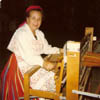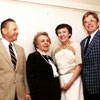Voldemar and Rita Matiisen
 Rita Matiisen was born in 1909 in Jogeva, Estonia at her father's private hospital. She graduated from the University of Tartu in Medicine in 1934 and completed her specialization in Dentistry in Vienna in 1937. In Tallinn, she first practiced medicine and then dentistry. In 1944 Rita along with her husband Voldemar and their three young children fled to Sweden to avoid the Soviet occupation. This was common among many other Estonian families.
Rita Matiisen was born in 1909 in Jogeva, Estonia at her father's private hospital. She graduated from the University of Tartu in Medicine in 1934 and completed her specialization in Dentistry in Vienna in 1937. In Tallinn, she first practiced medicine and then dentistry. In 1944 Rita along with her husband Voldemar and their three young children fled to Sweden to avoid the Soviet occupation. This was common among many other Estonian families.
The family emigrated to Canada in 1948 and settled on a farm in the Eckville area of central Alberta. Volli's younger twin brothers Alfred and Arnold had left Estonia in the 1920s and 1930s and were farming in the Medicine Valley where several hundred Estonians had also settled. For many years, the Medicine Valley and the Estonian Hall were the site of large social gatherings where Estonians could renew friendships, language and traditions. Rita and Volli were active community members and cherished this connection in hopes that their children would retain their Estonian language and appreciate their cultural roots.
The adaptation from professional careers to farm labour was difficult. They were fortunate to have helpful family and welcoming neighbours. The hardship of farming did not diminish their drive to participate in intellectual pursuits. The first school book purchased was a dictionary. Rita thus began to learn English, the fifth language that she had mastered. Rita assumed community leadership roles with respect to education and cultural activities. She held executive positions with and contributed significantly to the Alberta Home and School Association, Parkland Regional Library, Medicine Valley Estonian Society and the Red Deer International Folk Festival. In 1966, having seen her three children attend the University of Alberta, Rita herself attended the Faculty of Education and obtained a Teaching Certificate. Rita taught at Eckville High School and worked as the school librarian for 15 years.
 Following her retirement and the death of her husband in 1980, Rita moved to Red Deer from where she continued her farm business and remained active in the community. She became an active supporter of the Red Deer and District Museum. She even served on the board for many years. During this time, the Museum mounted a permanent display recognizing Alberta's Estonian pioneers. The display reflected years of research by Volli Matiisen who recorded and documented local Estonian history. A generous contribution from the proceeds of the sale of Medicine Valley Estonian Society helped to support this historically significant project. In 1984 Rita received the Alberta Achievement Award for community service.
Following her retirement and the death of her husband in 1980, Rita moved to Red Deer from where she continued her farm business and remained active in the community. She became an active supporter of the Red Deer and District Museum. She even served on the board for many years. During this time, the Museum mounted a permanent display recognizing Alberta's Estonian pioneers. The display reflected years of research by Volli Matiisen who recorded and documented local Estonian history. A generous contribution from the proceeds of the sale of Medicine Valley Estonian Society helped to support this historically significant project. In 1984 Rita received the Alberta Achievement Award for community service.
Her retirement years in Red Deer were active and happy. She became a local weaver and even became a founding member of the Parkland Weavers Guild. In Estonia weaving had a primarily functional rather than artistic purpose. Rita became a skilled and prodigious weaver of hand-woven, award-winning creations.
In 1989 Rita returned to Estonia to celebrate her 80th birthday. She was accompanied by Eda, her daughter, by her son, Arne, and Carolyn, Arne's wife. Estonia was still under Soviet rule and the family had not been back since leaving in 1944. The reunion with family and friends was immensely moving. The visit rekindled deep emotions. Rita and family were forced to face the difficult life of those who stayed behind, but also were also hopefull of the possibility of a free Estonia. Rita cherished her Estonian heritage but was proud to be Canadian.
Rita passed away in Red Deer in 1998 and is buried with her husband and son at the Gilby Kalmu Cemetery.








